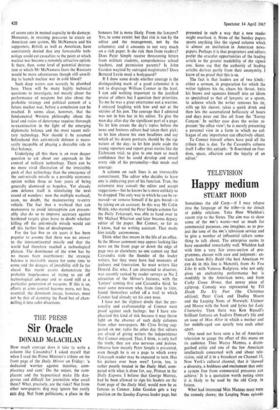Sir Oracle
THE PRESS DONALD McLACHLAN
How much courage does it take to write a column like Cassandra? I asked myself that when I read the Prime Minister's tribute on the front page of the Daily Mirror on Friday : 'a dedicated warrior against injustice, -Com- placency and cant.' Do the unjust, the com- placent and the hypocritical make life dan- gerous and difficult for journalists who assail them? What, precisely, are the risks? Not from other newspapers; dog may ignore but rarely eats dog. Not from politicians; a place in the
honours list is more likely. From the lawyers? Yes, to some extent; but that risk is run by the editor and the management, not by the columnist; and it amounts to not very much on a rich paper. Is the risk then from readers?
Does Peter Simple receive threatening letters from militant students, comprehensive school teachers, and permissive parents? Is John Gordon waylaid by outraged magistrates? Does Bernard Levin need a bodyguard?
If I show some doubt whether courage is the distinguishing mark of a good columnist it is not to disparage William Connor in the least.
I can add nothing important to the justified
praise of others but I question their priorities. To me he was a great entertainer not a warrior. I enjoyed laughing with him and not at the victims of his pen. The courage that I admired was not in him but in his editor. To give the
man day after day the significant part of a page.
To let him cream the day's topics before the news and features editors had taken their pick; to let him choose his own headlines and say which of his dozen portraits should be the sig- nature of the day; to let him jostle aside the young reporters and report great stories like the Eichmann trial; to give to one man so much confidence that he could develop and reveal every side of his personality—that needs real courage.
A column on such lines is an irrevocable commitment. The editor who decides to have one is abdicating part of his function. True, the columnist may consult the editor and accept suggestions—but he knows he is most unlikely to
be dropped. The only way in which he can be re-
moved—or remove himself if he gets bored—is by taking on an assistant. In this way Mr Colin Welch, who started the Peter Simple column for
the Daily Telegraph, was able to hand over to Mr Michael Wharton and later become deputy
editor of the paper. But Connor, so far as I know, had no writing assistant. That made him totally autonomous.
Think what that means in the life of an office. In the Mirror comment may appear looking like
news on the front page or down the edge of page two or elsewhere; so one cannot say that Cassandra stole the thunder of the leader writers, but they must have had moments of jealousy and frustration. So must writers like Donald Zec who, I am interested to discover, was recently ranked by reader surveys as No 2
attraction of the Mirror's features, with the 'Letters' coming first and Cassandra third. So
must some newsmen who, from time to time, found themselves called off a trail to which Connor had already set his own nose.
I have not the slightest doubt that the per- sonality and craftsmanship of Connor were proof against such feelings; but I have em- phasised this kind of risk because it may throw light on the absence of such daily columns
from other newspapers. Mr Clive Irving sug- gested on BBC radio the other day that editors are afraid of giving writers the independence that Connor enjoyed. That, I think, is only half the truth; they are also nervous and jealous. Observe how meanly Peter Simple is presented, even though he is on a page to which every Telegraph reader may be expected to turn. Has his picture ever been seen? Levin, too, is rather poorly treated in the Daily Mail, com- pared with what is done for, say, Pitman in the Daily Express. I believe that George Murray, had he been allowed to sign his leaders on the front page of the Daily Mail, would now be as famous as Connor. John Gordon gets a key position on the Sunday Express leader page, but
presented in such a way that a new reader might overlook IL None of the Sunday papers sports anything like the signed column which is almost an institution in American news- papers. Perhaps it is that proprietors and editors prefer the oracular opportunities of the leading article to the greater readability of the signed one. Some say that the authority of leading articles derives partly from their anonymity. I know of no proof that this is so.
The fact is that leaders are of two kinds: either a sermon, in preparation for which the writer tightens his tie, clears his throat, knits his brows and squeezes himself into an idiom as specialised as that of lawyers; or a spasm, to achieve which the writer removes his tie, rolls up his sleeves, takes a quick drink and then lets the accumulated bellicosity of hours and days pour out like oil from the 'Torrey Canyon.' In neither case does the writer re- present 'the office view'; he is merely presenting a personal view in a form to which no col- league of any importance can effectively object.
To Connor himself others have paid all the tribute that is due. To the Cassandra column itself I offer this epitaph : 'It flourished on free- dom, space, affection and the loyalty of an editor.'






























 Previous page
Previous page